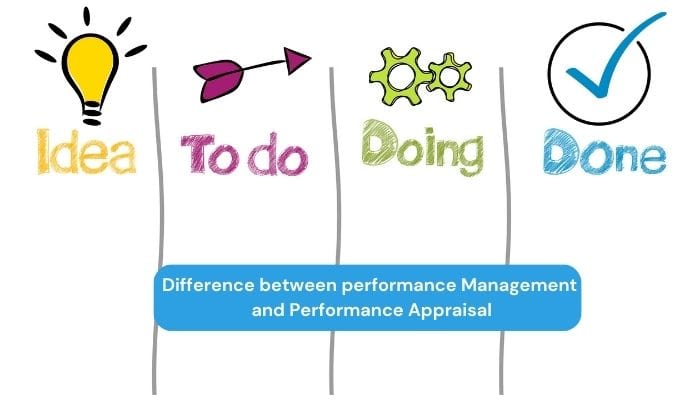In today’s dynamic workplace, performance management and performance appraisal are two terms that often come up when discussing employee evaluation and development. While they may seem similar, these concepts have distinct purposes and methodologies. In this blog post, we will explore the crucial distinctions between performance management and performance appraisal, shedding light on their unique characteristics and underscoring their significance in optimizing organizational success.
Key Differences between Performance Management and Performance Appraisal
Performance Management: A Holistic Approach to Drive Success
Performance management serves as a comprehensive and ongoing process aimed at aligning individual and organizational goals, enhancing employee performance, and fostering continuous improvement. This proactive approach involves a range of activities, strategies, and tools designed to promote excellence and enable growth within an organization. Key elements of performance management include:
- Goal Setting: Establishing clear, measurable goals that align with organizational objectives and provide direction for employees.
- Continuous Feedback and Communication: Regular and constructive feedback exchanges between managers and employees to discuss progress, strengths, areas for improvement, and address challenges.
- Skill Development and Training: Identifying training needs, providing learning opportunities, and supporting professional growth to enhance employee performance and facilitate career advancement.
- Performance Improvement Plans: Creating action plans to address performance gaps, providing necessary resources, and offering guidance to help employees improve their performance.
Performance Appraisal: Evaluating Past Performance
Performance appraisal, also known as performance evaluation or review, focuses on assessing employees’ past performance within a specific time frame. Typically conducted annually or semi-annually, it serves as a formal evaluation of an individual’s achievements, strengths, and areas for development. Key aspects of performance appraisal include:
- Evaluation of Achievements: Assessing employees’ accomplishments, tasks completed, and results achieved over a specific period, measuring their adherence to predefined goals and objectives.
- Rating and Ranking: Assigning ratings or rankings based on predetermined criteria, which inform decisions related to compensation, promotions, and rewards.
- Formal Documentation: Generating written records or reports summarizing an employee’s performance, providing feedback on strengths and areas for improvement.
- Performance Discussions: Engaging in formal discussions between managers and employees to review the evaluation, discuss feedback, and establish goals for future performance.
The Complementary Relationship:
While performance management and performance appraisal have distinct focuses and frequencies, they are interrelated and complementary. Performance appraisal serves as a critical component of the broader performance management process, providing structured evaluations that inform ongoing efforts. The feedback and insights gained from performance appraisal guide coaching, development initiatives, and goal setting within the performance management framework.
Conclusion:
Understanding the differences between performance management and performance appraisal is crucial for organizations to establish effective processes that drive employee engagement, development, and overall organizational success. By adopting a comprehensive performance management approach, organizations can foster a culture of continuous improvement, facilitate employee growth, and ensure alignment between individual and organizational objectives. Leveraging performance appraisal as part of this approach provides valuable feedback, guiding future development and decision-making. Striking the right balance between performance management and performance appraisal empowers organizations to optimize performance and cultivate a high-performing workforce.
